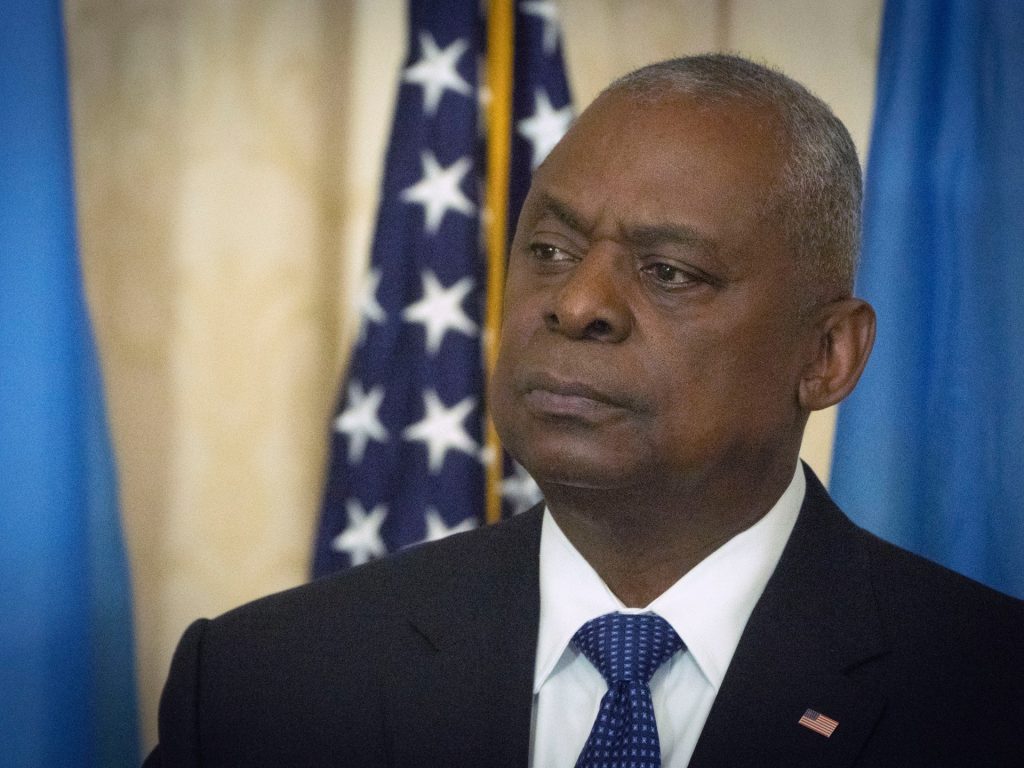A US military appeals court has denied an attempt by Pentagon chief Lloyd Austin to throw out possible plea deals for the suspected mastermind of the September 11, 2001 attacks and two of his associates.
The deals could see the three men – Khalid Sheikh Mohammed, Walid bin Attash and Mustafa al-Hawsawi – plead guilty to the attacks, which killed nearly 3,000 people. In exchange, they would be spared the possibility of the death penalty.
A hearing for Mohammed, who is accused of orchestrating the killings, is scheduled for next week.
The New York Times and Associated Press reported Monday evening that the military appeals court had ruled against Austin.
The decision upheld an earlier ruling by a military judge, Col. Matthew McCall, who ruled that Austin lacked standing to reject the plea deals after they were initially approved.
News of the possible plea deals broke months ago. They signaled a possible exit for a long-complicated case of the use of torture against prisoners involved in the so-called “global war on terror” launched by the US after the 9/11 attacks.
Legal experts have said the use of torture – dubbed “enhanced interrogation” by former President George W Bush’s administration – can prolong or prevent a conviction.
For example, revelations that Majid Khan, a former al-Qaeda courier, had been tortured on a Central Intelligence Agency (CIA) black site sparked public outcry. The CIA denied the allegations, but Khan’s lawyers described him as suffering sexual abuse, starvation and waterboarding.
In 2021, a military jury of eight officers sentenced Khan to 26 years in prison, the shortest possible sentence. But seven of the eight members on the panel urged the government to offer mercy, given the nature of Khan’s torture.
Like Khan and the other 9/11 defendants, Mohammed and the other two defendants are being tried by a special military commission created under World War II-era laws that allow foreign defendants to be prosecuted outside the criminal justice system. American justice.
While a Pentagon appointee had initially signed the plea deals, Austin sought to revoke the deals in August amid pressure from lawmakers and family members of the victims, who considered the deals too weak.
Austin later said he believed Americans deserved the chance to see the trials.
Defense attorneys, however, charged that Austin’s push to revoke the plea deals represented unlawful interference in the case.
Despite Monday’s ruling, Austin can still appeal the case to the U.S. Court of Appeals for the District of Columbia Circuit, which could cause further delays.
Years of sessions
Trials for the three men in the case and a fourth defendant, Ammar al-Baluchi, have lasted more than a decade. Unlike his three co-defendants, al-Baluchi has not agreed to plea negotiations.
All four accused are being held at the Guantanamo Bay detention center in Cuba.
The military prison has become a permanent symbol of US abuses since the 9/11 attacks, with dozens of prisoners still held there without rights guaranteed by US law.
US President Joe Biden’s administration had entered the office hoping to close the facility permanently, but it remains open as President-elect Donald Trump prepares to take office on January 20.
Once holding 800 prisoners, the Guantanamo Bay facility housed about 40 people when Biden took office in 2021.
Some of them have been transferred to second countries, including four in the last two weeks.
One of them includes Tunisian prisoner Ridah bin Saleh al-Yazidi. On Monday, the Pentagon announced that he had been repatriated to Tunisia.
Despite being approved for transfer more than a decade ago, al-Yazidi was held at the Guantanamo facility for years after no deal was previously reached with the Tunisian government.
Al-Yazidi, a suspected member of al-Qaeda, was never charged after he was arrested in Pakistan near the Afghan border in 2001.
According to the Pentagon, 26 people remain imprisoned at the Guantanamo Bay facility. Of that group, 14 are eligible for a transfer.


